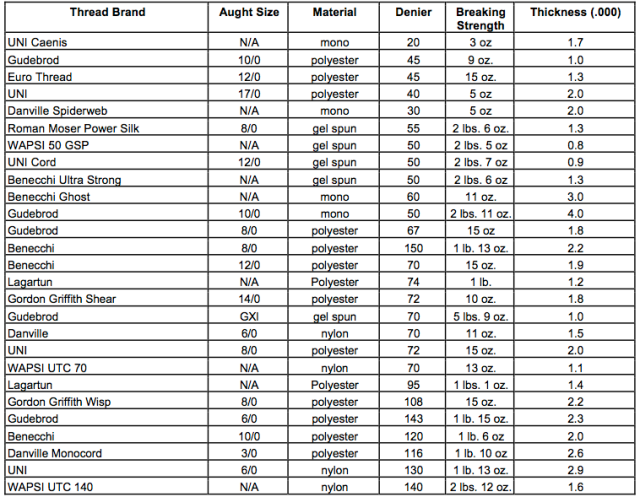Choosing thread
Here are some general rules.
1. There is no correlation between denier and the "aught" rating system. The "aught" system is good for a single manufacturer. A 6/0 from one manufacturer may be a thicker or thinner thread compared to a 6/0 from another manufacturer system. See comparison of Gudebrod and Benecchi below.
2. Breaking strength varies with the material and its diameter. For example, nylon thread from different manufacturers of the same diameter will have near identical breaking strength. See comparison of Gudebrod and Benecchi below.
The comparison between 8/0 Gudebrod vs 8/0 and 12/0 Benecchi shows how you cannot rely on the "aught" system. The 8/0 Benecchi is much thicker than Gudebrod. When equal thickness threads are compared, the 8/0 Gudebrod and 12/0 Benecchi, the breaking strengths are identical. Don't be fooled by the "aught" system.
Manufacturer/aught/material/denier/breaking strength/thickness in .000
3. Nylon and polyester thread have about the same breaking strength. GSP is much stronger.
4. There is NO FREE LUNCH. You cannot make a stronger thinner thread from identical materials. All you can do is to label a thread as being thinner using the "aught" system to make buyers think your thicker thread is as thin as a competitors and stronger.
5. Denier within as single material gives a true comparison of thickness. A lower denier will be thinner. Identical deniers of identical material will have near identical breaking strengths.
6. The way to pick thread is to pick the material and then pick whether you want the thread twisted or flat.
Here are recommendations:
1. I prefer a flat thread. It can be used for split thread dubbing loops. It lies flatter and is less bulky when wraps are stacked. It is less apt to cut through materials such as foam. It can be twisted when you need a twisted thread. If you do buy a twisted thread, get a non-bonded thread that can be untwisted.
2. I prefer polyester over nylon. It has less stretch. Nylon has brighter colors when you need a bright thread.
3. I use GSP thread only when I need extreme strength, for example, when flaring deer hair.
4. Stick with a single manufacturer at first to get familiar with the properties of the thread. For a newbie, I suggest nylon since it stretches before breaking and it gives you more "feedback" when you are reaching the thread limit.
Frontrangeanglers.com - Choosing the Right Thread
http://cdflyfishers.org/Fly Tying/Th... of denier.pdf
http://mvff.tripod.com/Reference/Denier.pdf
Here are two thread charts from the articles above.







 Reply With Quote
Reply With Quote